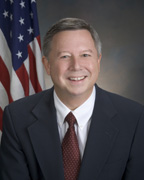 Gov. Dave Heineman, who has led the state’s efforts in bioterrorism preparedness since the terrorist attacks of Sept. 11, 2001, will present a prestigious lectureship at UNMC on Thursday, April 14.
Gov. Dave Heineman, who has led the state’s efforts in bioterrorism preparedness since the terrorist attacks of Sept. 11, 2001, will present a prestigious lectureship at UNMC on Thursday, April 14.
Heineman will present the Harry W. McFadden, Jr., M.D., Lectureship at 9 a.m. in the Durham Research Center’s Scott Auditorium. The lectureship is sponsored by the UNMC Department of Pathology and Microbiology and the Class of 1964 College of Medicine alumni.
Heineman’s presentation is titled, “Building on the Nebraska Model for Bioterrorism Preparedness.” The event is open to the campus community. A free continental breakfast will be served for those attending.
“We are absolutely thrilled that Gov. Heineman has agreed to present the McFadden Lectureship,” UNMC Chancellor Harold M. Maurer, M.D., said. “The governor has immersed himself in the area of bioterrorism preparedness over the past few years. Because of his efforts and the collaboration and expertise of many others, including Richard Raymond, M.D., the state’s chief medical officer, Nebraska is a national leader in this area.”
Sam Cohen, M.D., Ph.D., chairman of the Department of Pathology and Microbiology, said that Heineman’s work in developing the “Nebraska Model” has drawn praise from throughout the country.
“Gov. Heineman did a tremendous job in putting the Nebraska Model together,” Dr. Cohen said. “The Centers for Disease Control and Prevention (CDC) has recognized that Nebraska is a national leader because its efforts were coordinated at the highest level. Gov. Heineman deserves a tremendous amount of credit for that.”
Shortly after Sept. 11, Heineman assembled a homeland security advisory group consisting of leaders from state government, academic medicine and the private sector.
UNMC Chancellor Harold M. Maurer, M.D. and Steven Hinrichs, M.D., UNMC professor and director of the University of Nebraska Center for Biosecurity, are members of that group. Quickly, the state seized on prior collaborations between government, academia and the private sector and formed new alliances to combat potential bioterrorism.
Highlights of the Nebraska Model include:
- A newly opened 10-bed biocontainment unit at The Nebraska Medical Center. This biocontainment unit is one of only three in the nation, and it is a collaborative efforts with the state Health and Human Services System.
- The sharing of information technology infrastructure between the University of Nebraska and the Department of Administrative Services (DAS), to provide back-up capability in case of an emergency
- The integration of the private sector into the bioterrorism-preparedness network. For example, selected semi-trailer drivers now are trained to report suspicious activities on Nebraska highways.
- Nationally acclaimed education programs administered through the Center for Bioterrorism Education, a joint effort between UNMC, Creighton University and the state of Nebraska.
- Collaboration between the UNMC Health Professions Tracking Center and the state’s Health Alert Network for rapid notification of bioterrorism-related or emergency preparedness information. The system was critical in surveying Nebraska physicians to find unused influenza vaccine doses that could be redirected to vulnerable populations.
- The coordination of all bioterrorism preparedness-related projects between key partners such as the Nebraska Emergency Management Agency (NEMA), the Nebraska State Patrol and the National Guard, so that all participants know priorities.
Dr. Hinrichs, who also serves as director of the Nebraska Public Health Laboratory, said that Heineman has been crucial to the state achieving its status as a leader in bioterrorism preparedness.
“The amount of success that we have in Nebraska is unique to the nation, and Gov. Heineman deserves a lot of credit for that,” Dr. Hinrichs said. “Nebraska’s work is truly a team effort, and Gov. Heineman has been a very effective leader.”
More on Dr. McFadden
Dr. McFadden received his medical degree from UNMC, and he joined the faculty in 1949 as an instructor in Pathology and Bacteriology. He subsequently became professor and chairman of the Department of Medical Microbiology in 1956. He chaired the department until his retirement in 1985, when the department merged with the Department of Pathology and Laboratory Medicine. During his tenure, Dr. McFadden received many local awards, and he served on several state and national boards. On the national level, he was elected to the Council on Microbiology of the American Society of Clinical Pathologists, serving as its chairman for two years. He also is a former trustee and president of the American Board of Pathology. Dr. McFadden continues to live in Omaha.